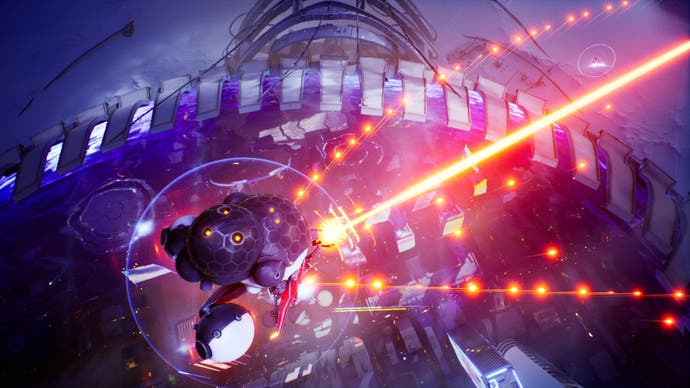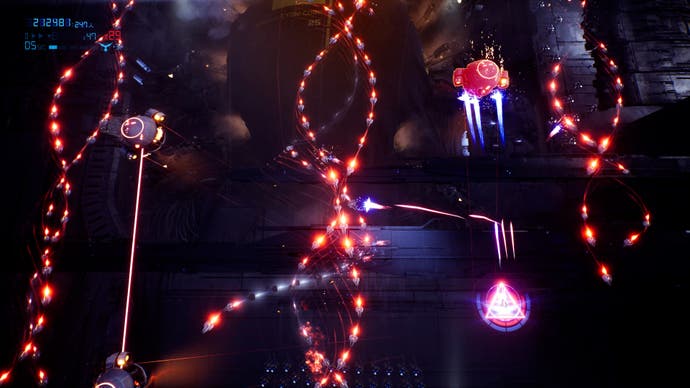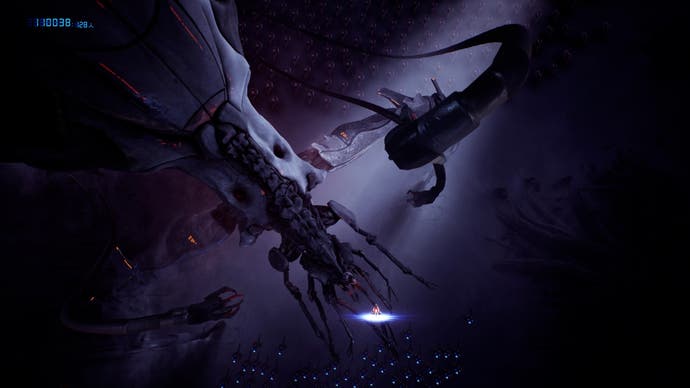KeelWork’s strikingly opulent shooter dares to do new things with its genre in an effort to unite players of every level. This is what a blockbuster shooter should look like.
Arcade shooting games are, in truth, about fragility. Despite their reputation as gaming’s most furious, excessive form, they almost universally place you at the controls of a weaponised weakling; a vessel that disintegrates after the briefest contact with a single enemy bullet.
That’s not the case with Cygni: All Guns Blazing, a new shooter that insists it’s OK to take dozens of enemy hits and stay in the game. That might sound like a reckless inversion of what makes the genre so special and rewarding. However, Scottish developer KeelWorks appears to have been meticulous in its subtle revolution of what a shooting game can be – and who it can serve. There’s even an argument to be made that Cygni proposes a vision of what a blockbuster shooter could be; namely staggeringly polished, technically muscular, and able to welcome and impress a vast mainstream audience.
Cygni is delightful, dazzling – and likely divisive. Embark on your first jaunt through the main campaign mode and you’ll find it unusually stuffed with cutscenes. Big, cinematic, detailed cutscenes that bring a thundering energy to the game compared to the brief animated intros or trad arcade attract screens most shooters tend to stick to, but their quality helps Cygni assert its blockbuster aspirations and appeal. They’re also, thankfully, entirely skippable – something critically important in a genre that goads replays from its fans.
Fortunately, the quality of these interstitial scenes extends to the main game, too. As you first swoop over the opening level, you get to peer into a city so bristling with detail it feels every part a living place. And from that moment forward, everything from the backdrops to the enemy design, soundscape and explosion effects is meticulously well-realised, powerfully establishing the tone of a desperate battle as society is overwhelmed and stretched thin by the arrival of war. The detail is so evocative, in fact, it’s like looking over a real-life diorama scene. As you dance with your rivals high in the heavens, you’ll even see swarms of tiny footsoldiers and vehicles below going to war with equally diminutive alien invaders.
KeelWorks’ creation is delivered in the ‘vertizontal’ style – that is, vertical scrolling over a horizontally-orientated playfield. That wider presentation doesn’t only lend it more cinematic energy; it also provides a much larger area to move across and assert control over. Fortunately, you are armed with a weapon that can be directed a good way to the left or right thanks to twin-stick inputs, upping coverage and offering less experienced players a chance to take down foes without ditting directly under their torrent of firepower.
For genre veterans, meanwhile, it opens up new strategies to explore – although at the cost of being arcade stick compatible. With homing missiles enabled, in many stages you’ll even find yourself moving all around larger enemies, unleashing ordnance in multiple directions. Your second weapon, meanwhile, takes the form of a laser that targets enemies on the ground below, bringing to mind the early scrolling shooter Xevious, and even the mighty Rayforce series. Being able to toggle both weapons’ lock-on status, you can swap between more powerful or more directed firepower.

Between stages you can upgrade weapons and custom design different firepower arrangements that can be hopped between on the fly in-game. That’s all very convenient, as you start out with something of an underpowered peashooter. Quickly, though, you realise this is a game about clearing the seven stages, and then returning over and over with your newly-upgraded capabilities, asserting greater dominance and the thrill of playing powered-up. Alas, the upgrade shop doesn’t explain much of its offering, and the weapon customisation feels impossible to comprehend during your early time with Cygni.
Here, by genre standards, the seven levels are long, clocking in between 10-15 minutes each, and sometimes more. Compared to the convention of a five-stage, 30-minute arcade shooter, that is significant. But again, Cygni doesn’t want to be held back by convention. This isn’t a shooter that encourages you to rush to its conclusion, hammering each stage back-to-back. It wants you to take your time to absorb its world. Once you’ve made it through to the end, most of your time will be spent drilling individual stages as separate entities, rather than tackling the game en masse. With that in mind, the protracted stage lengths make sense – even though they’ll surely drag to genre veterans.
More significantly, there is an elegance to the central game system that supports high-level play while recognising that most players will simply want an exhilarating ride. It’s still no pushover, but rather than lives, you are granted a generous shield that can take five hits. Many downed enemies produce a singular power-up that can be scooped up to give your shield one more unit of protection. Jab a button, and the shield unit is reassigned to your weapons, letting you power up, unleash expendable rockets, or continue the fight with multiple weapon arrangements. Those power-up units can be moved back to your shield if needed. And if your shield is full, the very same power-ups bank up as an in-game currency that can be spent on upgrades during the downtime between stages.

On the whole, the power-ups tend to rain down in great numbers, meaning you can often charge through a bullet curtain taking the hits, and then scoop up enough to immediately recover. As such, Cygni is truly a game of on-the-fly resource management as much as intently precise bullet-dodging. That’s especially true in the easiest difficulty setting. Up the intensity, and while you can still take a good number of hits, juggling resources to and fro between shield and weapons becomes an all-consuming strategic focus.
For genre veterans, there are still plenty of sections that rein in the flow of power-ups and instead ask you to carefully dodge every single bullet. Indeed, there could be a good number more of these stretches in the easy mode in particular. Up in the hard end of things, the difficulty is tremendous, and the ability to soak up damage more curtailed. In fact, its most challenging mode arguably sits closest to the genre’s existing conventions – yet Cygni is at its best when it leans into what makes it different.
This is why Cygni is still likely to cause a rift among certain players. Shifting its focus away from bullet-dodging will feel sacrilegious to many. If you’re an arcade die-hard, you may also feel Cygni’s bullet-sponge ship trivialises and undermines the entire point of playing; like a driving game that does most of the steering for you. Equally, that same group may feel the lengthy stages replace immaculately orchestrated, short-form sections with a little too much repetition, and protracted battles that feel like more a war of attrition.

The scoring, meanwhile, isn’t especially good at encouraging high-risk or otherwise daring play. It rewards downing numerous enemies back-to-back, and even chains of those combos; yet with so many enemies it’s hard not to be constantly downing targets, leaving the scoring feeling a shade disconnected from the way enemies and bullets arrive onscreen. Furthermore, the bullet visibility is less than perfect, with projectiles too often getting lost amid the cocktail of explosions and particle effects. And while the cutscenes bring so much quality, the narrative elements are a little familiar, and rather lacking in depth.
If you entirely favour a battle of wits with a spiralling, elaborate scoring system played out over a brief, uninterrupted onslaught, Cygni might not be for you. That said, its accomplishments with broad appeal are plainly apparent in the local co-op mode, where veterans and novices can share a meaningful experience together, even contributing to a shared score that lets both players’ efforts feed into the combos. It might be the game’s best mode.
Ultimately, this is no cynical dilution of the established shooter formula. Instead, the team has approached it from a rather different angle, resulting in a visually brilliant, technically ambitious, and highly engrossing thrill-ride of a shooter that doesn’t require you to be a genre devotee to enjoy. And that might be just what a blockbuster shooting game should look like.
A copy of Cygni: All Guns Blazing was provided for review by Konami.





